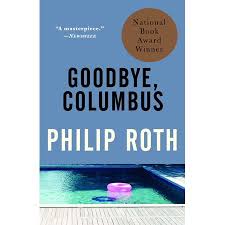Books |
Philip Roth: Goodbye, Columbus
By
Published: Jun 27, 2019
Category:
Fiction
Forget that “Goodbye, Columbus” won the 1960 National Book Award for fiction … just read the beginning of the novella.
The first time I saw Brenda she asked me to hold her glasses. Then she stepped out to the edge of the diving board and looked foggily into the pool; it could have been drained, myopic Brenda would never have known it. She dove beautifully, and a moment later she was swimming back to the side of the pool, her head of short-clipped auburn hair held up, straight ahead of her, as though it were a rose on a long stem. The rose glided dry to the edge and then it was beside me. “Thank you,” she said, her eyes watery though not from the water. She extended a hand for her glasses but did not put them on until she turned and headed away. I watched her move off. Her hands suddenly appeared behind her. She caught the bottom of her suit between thumb and index finger and flicked what flesh had been showing back where it belonged. My blood jumped…
The voice that answered was high, curt, and tired. “Hullo.”
I launched into my speech. “Hello-Brenda-Brenda-you-don’t-know-me-that-is-you-don’t-know-my-name-but-I-held-your-glasses-for-you-this-aftenoon-at-the-club…You-asked-me-to-I’m-not-a-member-my-cousin-Doris-is-Doris-Klugman-I-asked-who-you-were…” I breathed, gave her a chance to speak, and then went ahead and answered the silence on the other end. “Doris? She’s the one who’s always reading War and Peace. That’s how I know it’s the summer, when Doris is reading War and Peace.” Brenda didn’t laugh; right from the start she was a practical girl.
“What’s your name?” she said.
“Neil Klugman. I held your glasses at the board, remember?”
She answered me with a question of her own, one, I’m sure, that is an embarrassment to both the homely and the fair. “What do you look like?”
“I’m… dark.”
“Are you a Negro?”
“No,” I said.
“What do you look like?”
“May I come see you tonight and show you?”
“That’s nice”, she laughed. “I’m playing tennis tonight.”
“I thought you were driving golf balls.”
“I drove them already.”
“How about after tennis?”
“I’ll be sweaty after,” Brenda said.
It was not to warn me to clothes-pin my nose and run in the opposite direction; it was a fact, it apparently didn’t bother Brenda, but she wanted it recorded.
“I don’t mind,” I said, and hoped by my tone to earn a niche somewhere between the squeamish and the grubby. “Can I pick you up?”
She did not answer a minute; I beard her muttering, “Doris Klugman, Doris Klugman…” Then she said, “Yes, Briarpath Hills, eight fifteen.”
“I’ll be driving a—” I hung back with the year, “a tan Plymouth. So you’ll know me. How will I know you?” I said with a sly, awful laugh.
“I’ll be sweating,” she said and hung up.
In just those few lines, we get the picture: young people, summer lust. In the lines that follow, the picture becomes more complex. Neil lives in Newark, with his Aunt Gladys and Uncle Max, in a crazy household where no one eats the same meal or at the same time. Brenda Patimkin lives in Short Hills — a suburb so alien to Gladys that she uses its phone book to prop up a table.
You know where the story will go. Neil, poor, graduate of Rutgers, working at the public library, dark and Semitic, ambitious and resentful. Brenda, rich, assimilated (she’s had a nose job), Radcliffe. In the heat of the summer, they’ll have a romance that’s largely fueled by lust.
Ah, summer love. At the pool, under water, Neil pulls down the top of Brenda’s swimsuit and her breasts pop out — like fish. The every night passion in the game room at her house. Soon Brenda and Neil have worked themselves into a frenzy. But no one sees it — the Patimkins just don’t think that way. Their lives are about work and sports, about healthy, public competition: tennis, basketball in the driveway, golf.
The deserted swimming pool, silver on a grey day. Long walks on suburban streets just a few hundred feet higher — but so much cooler — than the streets of Newark. Bowls of fruit in the Patimkins’ basement refrigerator. Roth’s pace and pitch are flawless. [To buy the paperback from Amazon, click here. For the Kindle edition, click here.]
And, of course, The Conversation. It’s about love, it’s about a diaphragm, who can tell the difference? But one thing about a great writer — he wastes nothing. That diaphragm, like a revolver in Chekhov, will return in a later act, for Brenda will leave it home when she goes back to school and her mother will find it and all hell will break loose.
In 140 pages, the story gets resolved as we know it must. And more, it points to a future that Roth could barely imagine and that we know all about: the evolution of Neil into other first-person narrators who explore religion and status and striving in a remarkable body of work.
Philip Roth was 26 when he published “Goodbye, Columbus.” It won the Natiobal Book Award. A great achievement at any point in a writer’s career, but as a first effort, at that tender age….and then to fill the rest of the book with five accomplished short stories….I feel like Aunt Gladys: it’s hot in here, I need to sit down with a cool drink.
BONUS VIDEO
Of course there was a movie.


